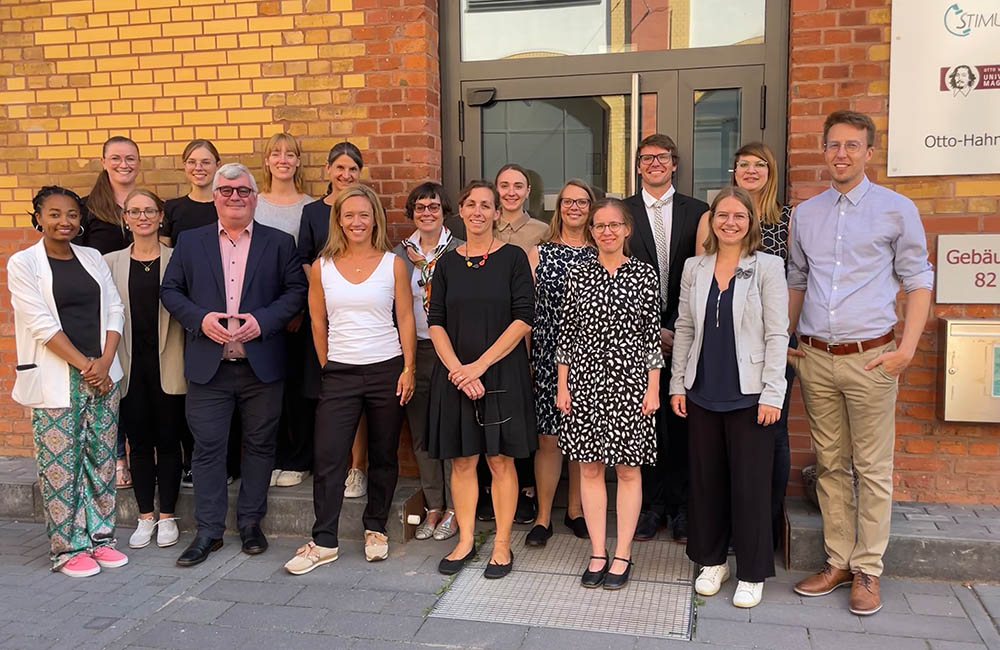HELICAP project extended: strengthening parents, protecting children
DFG supports pioneering research to strengthen the health literacy of the population for a further three years.
Dealing with health-related information and decisions is an enormous challenge for the majority of the population. The Germany-wide research group HELICAP (Health literacy in early childhood allergy prevention) is continuing its work to strengthen health literacy, particularly among parents of children with allergies and at increased risk of allergies. The German Research Foundation(DFG) has extended funding for the project, which is jointly led by the University Medical Center Magdeburg and the University of Education Freiburg, for a further three years. HELICAP is based on an interdisciplinary approach. With 20 experts from the fields of social sciences, health sciences and medicine at a total of six German university locations, different perspectives are combined. The aim is to improve the scientific basis in this field and to promote parents' health literacy in the long term.
In focus: strengthening health literacy
The research group is jointly coordinated by Prof. Dr. Christian Apfelbacher, Director of the Institute for Social Medicine and Health Systems Research (ISMG) at Otto von Guericke University Magdeburg and Prof. Dr. Eva Maria Bitzer, Deputy Director of the Institute for Everyday Culture, Exercise and Health at the Freiburg University of Education. Co-speaker Prof. Apfelbacher emphasizes: "Strengthening health literacy in the population is essential for improved care." At the same time, it has been shown that the complexity of the healthcare system and the large amount of health and disease information overwhelm many people. "More than half of the German population has difficulties finding, understanding and evaluating health information and using it to make self-determined health-related decisions. Studies show that higher health literacy is associated with better health. Strengthening health literacy is particularly important for parents of children with allergies or children at risk of allergies, as almost one in five children suffers from an allergic disease," explains the epidemiologist.

Photo: The HELICAP research group continues its work to strengthen the health literacy of parents of children with allergies and an increased risk of allergies.Photographer: HELICAP
Five sub-projects for comprehensive findings
In the second funding phase, HELICAP is concentrating in five sub-projects on the two topics of early childhood allergy prevention and COVID-19 in children with allergies. "Both topics are of great relevance to public health. Specifically, the aim is to develop measures to promote health literacy by identifying factors that prevent health-promoting decisions, taking social and environmental conditions into account and critically examining scientific evidence. Involving parents and those affected in the research is of central importance," says Apfelbacher.
The five sub-projects of HELICAP include evidence syntheses on interventions, the translation of knowledge by care actors, ethnographic studies on care practices, the connection between user perspectives and services as well as the epidemiology of parental health literacy and allergy prevention.
The funding extension enables HELICAP to have a stronger interventional character. Prof. Apfelbacher explains: "Our findings not only contribute to a better understanding of health decisions, but also enable the development of targeted measures."
Main research areas in Magdeburg
Magdeburg is responsible for the scientific coordination of the HELICAP project. Two sub-projects are also being implemented there. The "Living Systematic Reviews" project is concerned with creating an evidence ecosystem on the HELICAP topics. Under the title "Health professionals", the second sub-project, led by Dr. Julia von Sommoggy, is working with midwives to develop an educational measure on health literacy and early childhood allergy prevention.
The universities of Magdeburg, Regensburg and Mainz, the Freiburg University of Education and the medical universities in Hanover and Brandenburg are involved in the HELICAP research group (Fkz.: 409800133).
Further information on HELICAP is available on the homepage: www.helicap.org
Scientific contact
Prof. Dr. Christian Apfelbacher, Institute for Social Medicine and Health Systems Research at Otto von Guericke University Magdeburg, Telefon.: +49-391/67-24300,
Contact for prospective students
Eva-Maria Skiba, Research assistant, Institute for Social Medicine and Health Systems Research at Otto von Guericke University Magdeburg, Telefon: +49-391/67-24356,






